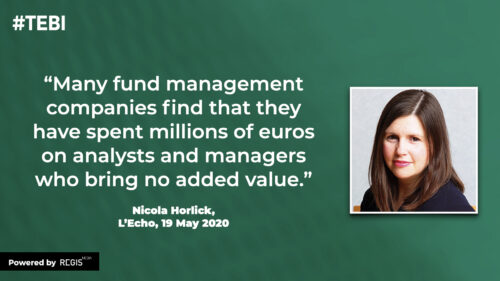
By ROBIN POWELL
I’ve never been Nicola Horlick’s biggest fan.
Horlick, you may recall, was hailed as a “City superwoman” in the 1990s for her ability to balance a large family with a successful career in the male- dominated fund management industry.
Her actual record as a fund manager was far from stellar. For example, there were claims that she lost her clients a considerable sum by investing in Bernie Madoff’s Ponzi scheme. Her latest venture, a peer-to-peer lending platform called Money & Co, appears not to be in great shape either.
But, to her credit, Horlick has given an interview to the Belgian business newspaper L’Echo in which gives makes a refreshingly honest assessment of the state of the fund management industry. Traditional active management, she says, is “dead and buried”.
Please note, the original article is in French, so these quotes have been translated, but here are some of things she had to say.

Traditional stock picking no longer works
“Employing managers and analysts to read the annual reports of listed companies, meet with management and decide whether the company investment.. no longer works.
“There’s more volatility, investors sell short and markets are run by algorithms. Consequently, it’s difficult to know if you are on the right side. Many fund management companies find that they have spent millions of euros on analysts and managers who bring no added value.”
Active management is a broken business model
“(If I ran a fund house today) I would choose quantitative management. Why continue traditional fund management? If you run a business, you should always ask yourself the following question, If I were a Martian, would I create the business like it is today? On the fund planet, the answer is clearly ‘no’.”
Active managers have lost any edge they once had
“I have worked for over 30 years in the fund industry and have come to the conclusion that active managers can no longer win. The markets have become very efficient and technology is further increasing that efficiency.
“When I started in wealth management, I had a phone with large buttons and a screen that gave me the prices of 30 British stocks with a few key figures for each. Good managers could obtain other information from companies by meeting management. Today we live in another world. Not only has the amount of information exploded, but you have less easy access to key business people. In addition, because of fines for insider trading, companies are less open and more reluctant to share information with a few ‘happy few’.”
Very few managers continuously create value
“It’s true (that some fund managers beat the market), but they fail to replicate these good results throughout their careers. Take Neil Woodford. He had success after success for years with his strategy of buying back undervalued shares. But when he created his own fund, he lost control. He bought unlisted companies, which are generally less liquid. In the end, he had to file for bankruptcy. These practices have undermined investor confidence in active management. If you look at things over the very long term, there are few people who have continuously created value.”
The Retail Distribution Review has left many UK investors unadvised
“The improvement in transparency has meant that independent advisers are increasingly focusing on important clients where they can more easily demonstrate their added value. As a result, many customers remained on the shelf. They then turned to the Hargreaves Lansdown fund platform, where advice is not a priority. Result: those most in need of advice no longer have access to it. This is not what was planned. This is the disadvantage of being a small investor. But hey, not all laws achieve their goals.”
European investors are too trusting of the banks
“There is undoubtedly more cost pressure. We have already experienced it in the UK. In Europe, things are still done differently: funds are sold via the banks, which control the distribution model. This allows them to charge higher fees. People are used to the banks taking care of everything and no one questions them. Clients have no idea what happens to their money and they do not receive independent advice.”
You can read the full interview here.
If you’re new to investing and want to learn more about active fund management and why it’s generally best avoided, you might like to watch the latest video in our series with Andrew Hallam:
How to become a millionaire, Part 3
Picture: Robert Bye via Unsplash









